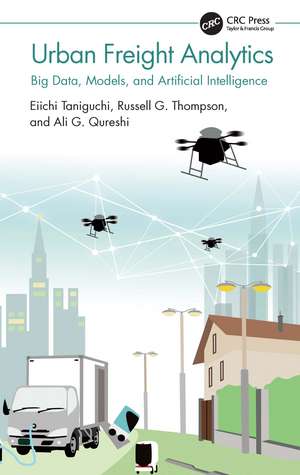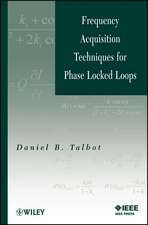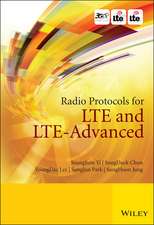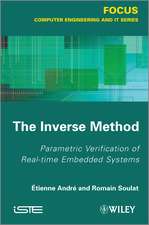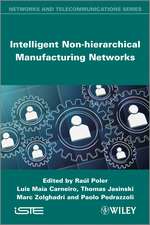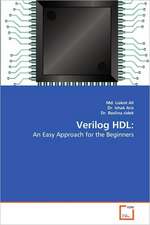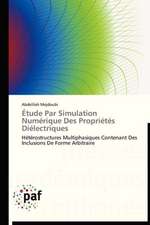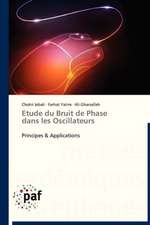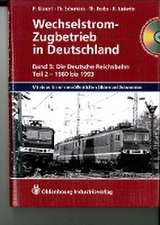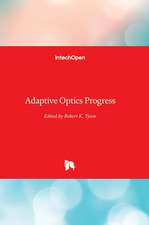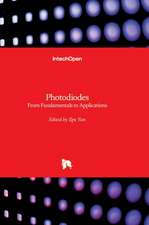Industrial Artificial Intelligence Technologies and Applications
Editat de Ovidiu Vermesan, Franz Wotawa, Mario Diaz Nava, Björn Debaillieen Limba Engleză Hardback – 11 sep 2023
Digital transformation is reshaping the manufacturing industry, and industrial edge AI aims to combine the potential advantages of edge computing (low latency times, reduced bandwidth, distributed architecture, improved trustworthiness, etc.) with the benefits of AI (intelligent processing, predictive solutions, classification, reasoning, etc.).
The industrial environments allow the deployment of highly distributed intelligent industrial applications in remote sites that require reliable connectivity over wireless and cellular connections. Intelligent connectivity combines IIoT, wireless/cellular and AI technologies to support new autonomous industrial applications by enabling AI capabilities at the edge and allowing manufacturing companies to improve operational efficiency and reduce risks and costs for industrial applications.
There are several critical issues to consider when introducing AI to industrial IoT applications considering training AI models at the edge, the deployment of the AI-trained inferencing models on the target edge hardware platforms, and the benchmarking of solutions compared to other implementations.
Next-generation trustworthy industrial AI systems offer dependability in terms of their design, transparency, explainability, verifiability, and standardised industrial solutions can be implemented in various applications across different industrial sectors.
New AI techniques such as embedded machine learning (ML) and deep learning (DL), capture edge data, employ AI models, and deploy these in hardware target edge devices, from ultra-low-power microcontrollers to embedded devices, gateways, and on-premises servers for industrial applications. These techniques reduce latency, increase scalability, reliability, and resilience; and optimise wireless connectivity, greatly expanding the capabilities of the IIoT.
This book provides an overview of the latest research results and activities in industrial AI technologies and applications, based on the innovative research, developments and ideas generated by the ECSEL JU AI4DI, ANDANTE and TEMPO projects.
The authors describe industrial AI's challenges, the approaches adopted, and the main industrial systems and applications to give the reader extensive insight into the technical nature of this field. The chapters provide insightful material on industrial AI technologies and applications.
This book is a valuable resource for researchers, post-graduate students, practitioners, and technoloyg developers interested in gaining insight into industrial edge AI, the IIoT, embedded machine and deep learning, new technologies, and solutions to advance intelligent processing at the edge.
The Open Access version of this book, available at http://www.taylorfrancis.com, has been made available under a Creative Commons Attribution-Non-Commercial (CC-BY-NC) 4.0 International License.
Preț: 686.55 lei
Preț vechi: 858.20 lei
-20% Nou
Puncte Express: 1030
Preț estimativ în valută:
131.39€ • 136.66$ • 108.47£
131.39€ • 136.66$ • 108.47£
Carte disponibilă
Livrare economică 24 martie-07 aprilie
Livrare express 08-14 martie pentru 29.13 lei
Preluare comenzi: 021 569.72.76
Specificații
ISBN-13: 9788770227919
ISBN-10: 8770227918
Pagini: 242
Ilustrații: 38 Tables, black and white; 5 Line drawings, color; 4 Line drawings, black and white; 58 Halftones, color; 1 Halftones, black and white; 63 Illustrations, color; 5 Illustrations, black and white
Dimensiuni: 156 x 234 x 19 mm
Greutate: 0.45 kg
Ediția:1
Editura: River Publishers
Colecția River Publishers
ISBN-10: 8770227918
Pagini: 242
Ilustrații: 38 Tables, black and white; 5 Line drawings, color; 4 Line drawings, black and white; 58 Halftones, color; 1 Halftones, black and white; 63 Illustrations, color; 5 Illustrations, black and white
Dimensiuni: 156 x 234 x 19 mm
Greutate: 0.45 kg
Ediția:1
Editura: River Publishers
Colecția River Publishers
Notă biografică
Dr. Ovidiu Vermesan holds a Ph.D. degree in microelectronics and a Master of International Business (MIB) degree. He is Chief Scientist at SINTEF Digital, Oslo, Norway. His research interests are in smart systems integration, mixed-signal embedded electronics, analogue neural networks, edge artificial intelligence and cognitive communication systems. Dr. Vermesan received the SINTEF’s 2003 award for research excellence for his work on the implementation of a biometric sensor system. He is currently working on projects addressing nanoelectronics, integrated sensor/actuator systems, communication, cyber–physical systems (CPSs) and Industrial Internet of Things (IIoT), with applications in green mobility, energy, autonomous systems, and smart cities. He has authored or co-authored over 100 technical articles, conference/workshop papers and holds several patents. He is actively involved in the activities of the European partnership for Key Digital Technologies (KDT). He has coordinated and managed various national, EU and other international projects related to smart sensor systems, integrated electronics, electromobility and intelligent autonomous systems such as E3Car, POLLUX, CASTOR, IoE, MIRANDELA, IoF2020, AUTOPILOT, AutoDrive, ArchitectECA2030, AI4DI, and AI4CSM. Dr. Vermesan actively participates in national, Horizon Europe and other international initiatives by coordinating and managing various projects. He is the coordinator of the IoT European Research Cluster (IERC) and a member of the board of the Alliance for Internet of Things Innovation (AIOTI). He is currently the technical co-coordinator of the Artificial Intelligence for Digitising Industry (AI4DI) project.
Dr. Franz Wotawa received ab M.Sc. in Computer Science (1994) and a Ph.D. in 1996 both from the Vienna University of Technology. He is currently a professor of software engineering at the Graz University of Technology. From the founding of the Institute for Software Technology in 2003 to the year 2009 and starting in 2020 Franz Wotawa has been the head of the institute. His research interests include model-based and qualitative reasoning, theorem proving, mobile robots, verification and validation, and software testing and debugging. Besides theoretical foundations, he has always been interested in closing the gap between research and practice. Starting from October 2017, Franz Wotawa has been the head of the Christian Doppler Laboratory for Quality Assurance Methodologies for Autonomous Cyber-Physical Systems. During his career, Franz Wotawa has written more than 430 peer-reviewed papers for journals, books, conferences, and workshops. He has supervised 100 master’s and 38 Ph.D. students. For his work on diagnosis, he received the Lifetime Achievement Award of the Intl. Diagnosis Community in 2016. Franz Wotawa has been a member of a various number of program committees and organized several workshops and special issues of journals. He is a member of the Academia Europaea, the IEEE Computer Society, ACM, the Austrian Computer Society (OCG), and the Austrian Society for Artificial Intelligence and a Senior Member of the AAAI.
Dr. Mario Diaz Nava has a Ph.D, and M.Sc., both in computer science, from Institut National Polytechnique de Grenoble, France, and a B.Sc. in communications and electronics engineering from Instituto Politecnico National, Mexico. He has worked in STMicroelectronics since 1990. He has occupied different positions (designer, architect, design manager, project leader, program manager) in various STMicroelectronics research and development organisations. His selected project experience is related to the specifications and design of communication circuits (ATM, VDSL, Ultra-wideband), digital and analogue design methodologies, system architecture and program management. He currently has the position of ST Grenoble R&D Cooperative Programs Manager, and he has actively participated, for the last five years, in several H2020 IoT projects (ACTIVATE, IoF2020, Brain-IoT), working in key areas such as security and privacy, smart farming, IoT system modelling, and edge computing. He is currently leading the ANDANTE project devoted to developing neuromorphic ASICS for efficient AI/ML solutions at the edge. He has published more than 35 articles in these areas. He is currently a member of the Technical Expert Group of the PENTA/Xecs European Eureka cluster and a Chapter chair member of the ECSEL/KDT Strategic Research Innovation Agenda. He is an IEEE member. He participated in the standardisation of several communication technologies in the ATM Forum, ETSI, ANSI and ITU-T standardisation bodies.
Mr. Björn Debaillie leads imec’s collaborative R&D activities on cutting-edge IoT technologies in imec. As program manager, he is responsible for the operational management across programs and projects, and focusses on strategic collaborations and partnerships, innovation management, and public funding policies. As chief of staff, he is responsible for executive finance and operations management and transformations. Björn coordinates semiconductor-oriented public funded projects and seeds new initiatives on high-speed communications and neuromorphic sensing. He currently leads the 35M€ TEMPO project on neuromorphic hardware technologies, enabling low-power chips for computation-intensive AI applications (www.tempo-ecsel.eu). Björn holds patents and authored international papers published in various journals and conference proceedings. He also received several awards, was elected as IEEE Senior Member and is acting in a wide range of expert boards, technical program committees, and scientific/strategic think tanks.
Dr. Franz Wotawa received ab M.Sc. in Computer Science (1994) and a Ph.D. in 1996 both from the Vienna University of Technology. He is currently a professor of software engineering at the Graz University of Technology. From the founding of the Institute for Software Technology in 2003 to the year 2009 and starting in 2020 Franz Wotawa has been the head of the institute. His research interests include model-based and qualitative reasoning, theorem proving, mobile robots, verification and validation, and software testing and debugging. Besides theoretical foundations, he has always been interested in closing the gap between research and practice. Starting from October 2017, Franz Wotawa has been the head of the Christian Doppler Laboratory for Quality Assurance Methodologies for Autonomous Cyber-Physical Systems. During his career, Franz Wotawa has written more than 430 peer-reviewed papers for journals, books, conferences, and workshops. He has supervised 100 master’s and 38 Ph.D. students. For his work on diagnosis, he received the Lifetime Achievement Award of the Intl. Diagnosis Community in 2016. Franz Wotawa has been a member of a various number of program committees and organized several workshops and special issues of journals. He is a member of the Academia Europaea, the IEEE Computer Society, ACM, the Austrian Computer Society (OCG), and the Austrian Society for Artificial Intelligence and a Senior Member of the AAAI.
Dr. Mario Diaz Nava has a Ph.D, and M.Sc., both in computer science, from Institut National Polytechnique de Grenoble, France, and a B.Sc. in communications and electronics engineering from Instituto Politecnico National, Mexico. He has worked in STMicroelectronics since 1990. He has occupied different positions (designer, architect, design manager, project leader, program manager) in various STMicroelectronics research and development organisations. His selected project experience is related to the specifications and design of communication circuits (ATM, VDSL, Ultra-wideband), digital and analogue design methodologies, system architecture and program management. He currently has the position of ST Grenoble R&D Cooperative Programs Manager, and he has actively participated, for the last five years, in several H2020 IoT projects (ACTIVATE, IoF2020, Brain-IoT), working in key areas such as security and privacy, smart farming, IoT system modelling, and edge computing. He is currently leading the ANDANTE project devoted to developing neuromorphic ASICS for efficient AI/ML solutions at the edge. He has published more than 35 articles in these areas. He is currently a member of the Technical Expert Group of the PENTA/Xecs European Eureka cluster and a Chapter chair member of the ECSEL/KDT Strategic Research Innovation Agenda. He is an IEEE member. He participated in the standardisation of several communication technologies in the ATM Forum, ETSI, ANSI and ITU-T standardisation bodies.
Mr. Björn Debaillie leads imec’s collaborative R&D activities on cutting-edge IoT technologies in imec. As program manager, he is responsible for the operational management across programs and projects, and focusses on strategic collaborations and partnerships, innovation management, and public funding policies. As chief of staff, he is responsible for executive finance and operations management and transformations. Björn coordinates semiconductor-oriented public funded projects and seeds new initiatives on high-speed communications and neuromorphic sensing. He currently leads the 35M€ TEMPO project on neuromorphic hardware technologies, enabling low-power chips for computation-intensive AI applications (www.tempo-ecsel.eu). Björn holds patents and authored international papers published in various journals and conference proceedings. He also received several awards, was elected as IEEE Senior Member and is acting in a wide range of expert boards, technical program committees, and scientific/strategic think tanks.
Cuprins
1. Benchmarking Neuromorphic Computing for Inference 2. Benchmarking the Epiphany Processor as a Reference Neuromorphic Architecture 3. Temporal Delta Layer: Exploiting Temporal Sparsity in Deep Neural Networks for Time-Series Data 4. An End-to-End AI-based Automated Process for Semiconductor Device Parameter Extraction 5. AI Machine Vision System for Wafer Defect Detection 6. Failure Detection in Silicon Package 7. S2ORC-SemiCause: Annotating and Analysing Causality in the Semiconductor Domain 8. Feasibility of Wafer Exchange for European Edge AI Pilot Lines 9. A Framework for Integrating Automated Diagnosis into Simulation 10. Deploying a Convolutional Neural Network on Edge MCU and Neuromorphic Hardware Platforms 11. Efficient Edge Deployment Demonstrated on YOLOv5 and Coral Edge TPU 12. Embedded Edge Intelligent Processing for End-To-End Predictive Maintenance in Industrial Applications 13. AI-Driven Strategies to Implement a Grapevine Downy Mildew Warning System 14. On the Verification of Diagnosis Models
Descriere
This book overviews the latest research results and activities in industrial artificial intelligence technologies and applications based on the innovative research, developments and ideas generated by the ECSEL JU AI4DI, ANDANTE and TEMPO projects.
